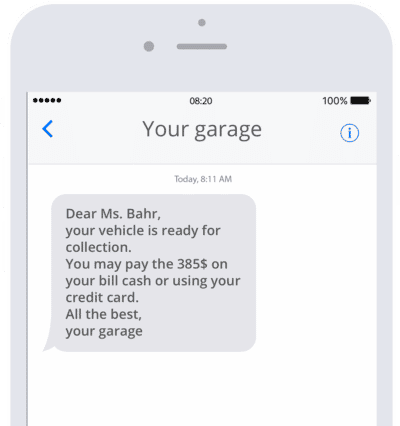In this interview, Christian Leo, CEO of seven.io, talks about industries in which automated SMS dispatch is increasingly in demand during the corona crisis and how this opens up new messaging opportunities in the B2B sector. He also looks at the development of SMS in recent years.
Are SMS gateways experiencing a renaissance due to the Corona crisis? – An interview with messaging expert Christian Leo
Since the Corona crisis, numerous innovations have sprung up to digitally simplify business processes. The market is booming, especially in the healthcare sector. There is a lot of talk about so-called tracing apps that are supposed to trace contact with people infected with Corona. Ever since the outbreak, retail has also been relying more and more on digitalisation. Aldi Süd, for example, has equipped half of its stores with sensors since mid-April in order to record customer flows automatically. The pandemic is also forcing the automotive industry to rethink: In German car dealerships many customers simply stay away during the crisis. Digital measures are adopted to boost sales again. What role does SMS play in this?
In April, Deutsche Telekom and SAP received an order from the German government to establish the decentralized Corona app for the planned contact tracing. Today the app will be released. If a contact is infected with the corona virus, the person at risk will be informed. Data protectionists have reservations about the corona app. What do you think?
“The Corona Tracing App could be questionable in terms of data protection. I find it worrying that it is the big, slow players, who have been awarded the contract and not one of the many very agile companies we have in Germany. The way things stand at the moment, however, the app is completely open source and looks very clean so far.
With the connection to special Bluetooth beacons it would potentially be possible for people without a smartphone to participate in the tracing. The notification could be sent via SMS directly to the mobile phone. The Austrian startup Dolphin Technologies has developed an app against COVID-19 within two weeks, which meets all criteria as a cost-effective alternative. Novid20 is free and open source and otherwise corresponds exactly to the Corona App, which the government is now buying for expensive money from SAP/Telekom.”
The Stuttgart-based start-up Sensalytics has already equipped half of the Aldi South shops with sensors. If the maximum number of persons in the store is exceeded, the employees automatically receive a free notification via email or SMS. However, notification by SMS costs 0.23 cents on request from Sensalytics. Are there cheaper solutions in the SMS gateway area? And if so, are the alternatives of equal quality?
“Yes, there are cheaper alternatives, but they are not all qualitatively equivalent. This raises the question of how the SMS should be sent. First, there is the direct connection to the network operators. We are connected to the German networks, but of course not worldwide. For sending to networks that are not connected tu us directly, we continue to use partners that have a corresponding connection. And then there are the large tier 1 aggregators, which really do have many direct connection options, to all networks, so to speak. So this is how it works in theory. In practice, there are many resellers and resellers of resellers and so on. Here, the SMS partly goes through various nodes before it gets to the network operator. Obviously, these long transmission chains are more prone to errors.
There are also the grey routes. These are network routes that the large network operators cannot prevent and from which they earn nothing. These routes are therefore very cheap, but by now the network operators block them quite well. The quality is of course mostly abysmal, but the prices are very cheap. In the field, I have noticed with many, even very large, providers that a small number of SMS are delivered very well, but as soon as there is more traffic, there are complaints about undelivered messages.”
So what should customers pay attention to when booking a messaging service?
“Many people only look at the price, but the delivery quality of the SMS as well as the service & support are also important components.Unfortunately this is neglected by many competitors. In addition, you need to think about data protection and security. The decisive factor for many customers is that we are based in Germany and therefore the data does not go abroad. But we have even more to offer, of course: Simple and good APIs are also very important.”
The decisive factor for many customers is that we are based in Germany.
What does the future of SMS look like?
“SMS are, as is email, an ancient and technically not very innovative means of communication. However, they are and will continue to be the means of communication in the application-to-person (A2P) area in the near future. SMS have by far the highest reading and opening rate and are the only notification system that can reach almost anyone in the world immediately, regardless of apps and internet connections. The successor RCS is at the ready, but is not making much progress due to various reasons. SMS will therefore continue to be decisive for fast and reliable A2P messaging in the coming years.
More and more companies are discovering the advantages of relevant and fast information as a great added value for their end customers. Due to this focus on service and relevance in marketing and due to the ever increasing interlocking in the API Economy, A2P SMS will continue to play a major role.”
Best regards
Header picture by zubada via iStock.com

